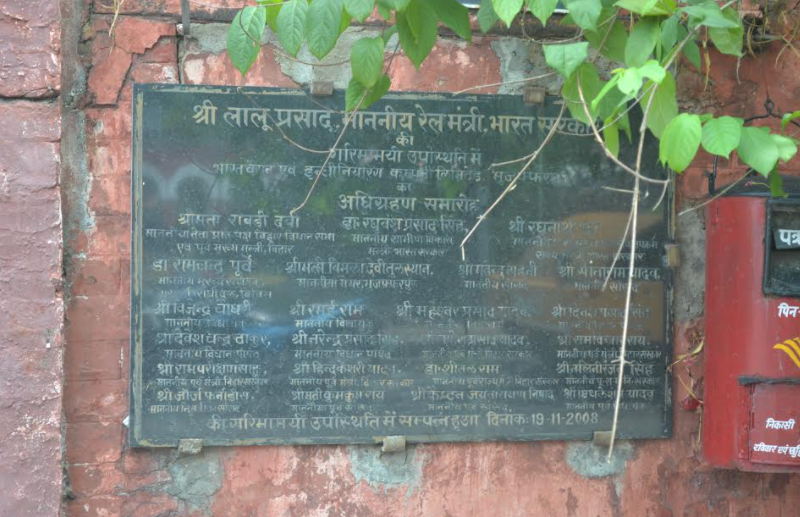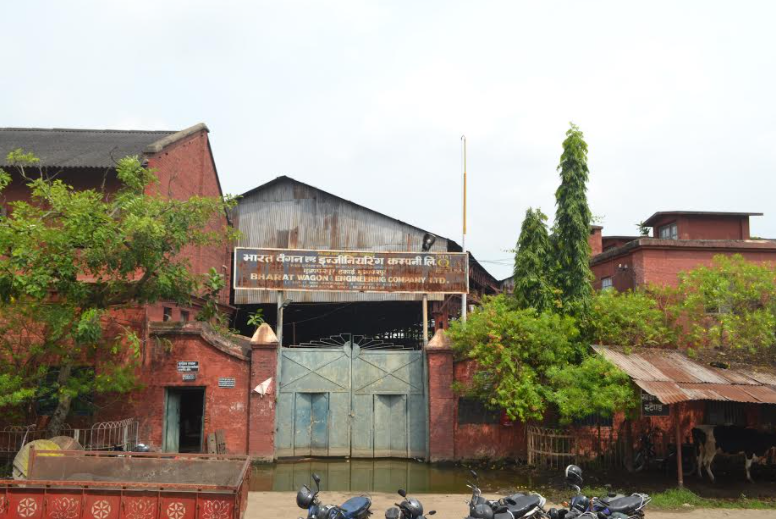Bihar: Once a Crown Jewel, Railways’ PSU Bharat Wagon Loses its Shine
Muzaffarpur: Explicit privatisation, indecisiveness, a lack of investment and policy apathy have taken a toll on public sector companies in Bihar. A cursory glance at Bharat Wagon and Engineering Corporation Limited (BWEL) — a Central Public Sector Enterprise (CPSE) under the Ministry of Railways — reveals the rich history of PSUs in the state. Unfortunately, the majority of them were shut down, one after the other, after they were declared “loss-making” units.
Two units of BWEL — one in Muzaffarpur and the other at Mokama in Patna district — were closed on September 11, 2017, following approval by the Cabinet Committee on Economic Affairs, chaired by Prime Minister Narendra Modi, to shut down the “sick” company.
With a rich experience of steel fabrication of over half century, BWEL had almost all the desired infrastructure facilities for heavy steel fabrication. The two manufacturing facilities were self-sufficient in power generation. Because of being located adjacent to railway stations, the plants had an operational ease.
The sudden decision to shut down the two units left 626 employees jobless at the fag end of their careers. It also impacted thousands of families which were indirectly dependent on the industry.
The existing employees were offered VRS (Voluntary Retirement Scheme)/VSS (Voluntary Separation Scheme) packages and the retrenchment of employees who did not opt for VRS/VSS happened under the Industrial Disputes Act, 1947.
Read More: Katihar Jute Mills' Closure Pushes Workers, Farmers to a Dead-End
The government had approved providing one-time financial grant of Rs 151.18 crore for settling with the employees (at the 2007 pay-scale) and for clearing the outstanding liabilities of the company. BWEL was supposed to pay back the railway ministry by disposing its movable and immovable assets (plants and machinery).
The workers said the VRS was imposed upon them without any clarity about benefits and the pay scale at which it was to be given. “Even those who are sentenced to death are asked for a last wish before execution, but we were fired without any prior notice, which should have been served at least three months in advance. After serving the company for 27 to 30 years, where will we go now? Who who hire us given our age? The retrenchment has impacted our families. We are unable to fund the education of our children. We are on the verge of starvation,” a former employee told NewsClick.
Glaring Violation
The company management did not allegedly work in the line with the Centre and put out a notice asking workers to submit their applications for VRS/VSS up to October 31, 2017. It was done without finalising the pay scale.
“After the management refused to come clean on the VRS package at the 2007 pay-scale, we (24 of 276 workers at the BWEL’s Muzaffarpur unit) refused to apply for the same and continued working. We delivered the pending order of wagons. On December 31, 2017, we were served a retrenchment notice,” Dinesh Kumar Thakur, a worker in the maintenance department and president of the Bharat Wagon Labours’ Union — affiliated to the All India Trade Union Congress (AITUC), told NewsClick.
The allegation also found its way to Muzaffarpur MP Ajay Nishad, who had shot off a letter Union Minister for Railways Piyush Goyal on October 12, 2017, complaining that the BWEL management is not complying with the Union Cabinet’s decision for benefits to be provided to its employees.
The retrenched workers also staged a sit-in against the company’s management from January 2, 2018 to March 19, 2020. They called off the dharna after the lockdown to contain COVID-19 was announced.
On October 16, 2019, they even stopped the BWEL’s management from inspecting the plant. The officials had landed up to estimate the value of the machinery for an auction. “A huge contingent of police force accompanied by senior officials was called in. For 24 unarmed men, the management had to take the help of over 300 armed men. Railway officials could enter the unit only after we were taken into preventive custody,” Thakur said.
Asked about the remaining workers who accepted the VRS package, the union’s secretary, Manoj Kumar – who worked in the production department – alleged: “They fell in line after the management, along with the Bharat Wagon Workers’ Union (Revolutionary Socialist Party (India) - affiliated union) leaders threatened them with retrenchment. They were told that they would end up losing even the VRS benefits and would be terminated without payment if they don’t opt for the company’s proposal.”
Read More: Bihar Sugar Industry: Long Tale of Sweet Memories, Bitter Truth
The allegation that the Bharat Wagon Workers’ Union was in collusion with the management was denied by its general secretary Sajjan Kumar Verma, who claimed it was they who fought for workers’ welfare till the end.
“We fought against the management, which had been hell-bent on closing the two units since 2002. We ensured that operations were not halted. After the company was shut down, we fought for the VRS package at the 2007 pay scale. We were duty bound to ask the workers to accept the VRS in their larger interest. Had they not done so, they would have lost the money they got. They company had to close its operations after the Union Cabinet’s approval. In case of rejection of the VRS package as announced by the Centre, termination was their fate. These people (the 24 employees) were misguided to not opt for the VRS package. They were told to continue with their work, and that the money would be adjusted if the company stops operations,” he said, terming the closure “unfortunate” – a part of the Modi government’s policy to privatise.
BWEL was incorporated in December 1978. It took over private sector companies Arthur Butler & Corporation Limited and Britannia Engineering Corporation Limited. It was referred to the Board for Industrial & Financial Reconstruction (BIFR) in December 2000 which declared it ‘sick’ in 2002, with a “low probability of its revival in view of the continued poor physical and financial performance of the company for over 10 years”.
The BWEL was earlier under the Department of Heavy Industry of the Ministry of Heavy Industries & Public Enterprises. From August 13, 2008, the administrative control of the company was transferred to the Ministry of Railways when Lalu Prasad Yadav was the minister for railways.

Addressing a function organised to mark the takeover, Yadav had said that the production capacity of BWEL’s two units would be doubled and the worker strength would be enhanced in the near future. “The Bharat Wagon units that were up for sale during the NDA regime at the Centre would henceforth become thriving units under the supervision of the Indian railways,” he was quoted saying, further claiming that the “we (Indian Railways) mean business and believe in turning around the sick and nonviable units” and that “both the Bharat Wagon units would soon become viable”.
The agitating workers said they had celebrated the take over as it had eased their worry of losing jobs and getting salary on time. “After the take over, our salaries, which we used to get in installments in the form of a package, was regularised. Though we still were still working at a 1992 pay-scale, getting a full salary at the end of the month was a big relief. But this happiness was short lived. After Laluji demitted office in 2009, the situation was back to square one and the threat of closure began looming large,” said Manoj Kumar.
Read More: Loot and Plunder — The Story of Closure of Darbhanga’s Ashok Paper Mill
The hope that those who did not opt for the VRS would be taken in by the railways was not baseless, the workers said. “Piyush Goyal, the railways minister, is on record promising us that we would be taken in by the railways for the left over service period,” they added.
Nishad too has urged the minister to induct the workers in the department. “It is further requested to adjust approx 100-150 employees of the company by giving employment in railways/its PSU, who are still young and do not want to opt VRS. They all are skilled and experienced workers, and it is not a difficult job for their suitable adjustment in Railways (sic),” he had written in the letter, which was acknowledged by Goyal in a letter dated November 2, 2017.
“...the above mentioned has been sent to the concerned directorate for consideration and necessary action as per rules,” read the acknowledgment letter.
Was BWEL Really Sick?
Verma said the company was suffering from mismanagement, apathy and step-motherly treatment by the railway ministry. He said the plant was totally dependent on the railways for orders of wagons. In a bid to award the contract to private companies, he alleged that the ministry stopped wagon manufacturing at BWEL, reducing it to company meant for repairing work only.
“The railway ministry purposely failed to enhance the capacity of the plant. It also slashed the rate of wagons in 2013 without considering the minimum investment in it. Instead of an investment of Rs 14 lakh on each wagon, the ministry reduced its price from Rs 16.58 lakh to Rs 11.74 lakh only,” he said.
“The company had placed a demand for capital worth Rs 43.63 crore in December 2011, but the ministry released the funds in four installments between April 2013 and June 2015, as a result of which the relevance of the financial help was lost. Nevertheless, the plant manufactured 156 wagons at the rate of 22 wagons per month. But price reduction and the dependency on two private firms from Kolkata for spare parts hastened its sickness,” he added.

The agitating workers also alleged that the company was made “sick” as part of a “conspiracy”; by not supplying raw materials as requisitioned and on time. “When the company was shut, it was making a profit. Corruption in acquiring raw materials made production costlier. As a result, we could not compete with private players in production costs. Even RITES Limited (an engineering consultancy company), following an inspection of the two units on April 15, 2015 and August 16, 2016, had recommended the railway ministry to continue operations of the two plants. It had said the closure is not viable as it would cost the railways ministry Rs 600 crore, but the revival would need Rs 200 crore,” said Raj Kumar, a crane operator at the Muzaffarpur unit.
Read More: Shut Down Over 3 Years Ago, Bihar's Jute Mill Slowly Turning to Ruins
After the then BWEL General Manager R.R. Prasad declared a profit of Rs 16 crore in 2011-12, the workers alleged that he was replaced with K.L. Bhatia, who reported that the facility was incurring a huge loss. The process of closure began when Mahesh Roy was appointed as the general manager in 2017.
NewsClick could not independently verify the claims made by the workers. At least three senior railway officials refused to comment on the matter, adding that the matter was subjudice in the Patna High Court. The striking workers have dragged the company to the court, which is yet to pronounce a verdict.
“Even if the company turned sick as claimed, it could have been revived with revival packages instead of closure. When people fall ill, they are provided medical treatment; they are not killed by injecting them with poison. So, as far as the quality of work done by Bharat Wagon is concerned, the then union industries minister had remarked that the company accomplished 99.44% of its work during 2000-2001 – the best performance among the country’s 48 public sector undertakings. That year, we had produced 120 wagons in a month,” said Kumar.
Inaction of State Government
The workers and their unions lashed out at the Chief Minister Nitish Kumar-led government in the state for not bothering about the factory’s closure.
“Being the chief minister of the state for the past 15 years, Nitish Kumar never ever made any attempt to stop this de-industrialisation. He never talked about Bharat Wagon, which was one of the most important industries in his state. We tried to meet him with our grievances once, but he flatly refused. He even did not ask anyone to listen to us on his behalf,” said the workers.
Notably, Kumar’s party, the Janata Dal (United), is an ally of the National Democratic Alliance (NDA) — which is in power at the Centre as well as in the State.
Get the latest reports & analysis with people's perspective on Protests, movements & deep analytical videos, discussions of the current affairs in your Telegram app. Subscribe to NewsClick's Telegram channel & get Real-Time updates on stories, as they get published on our website.
























